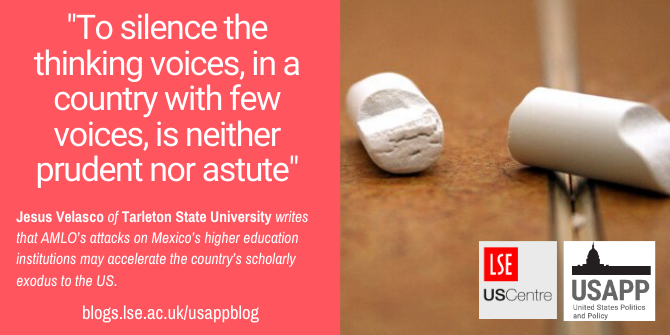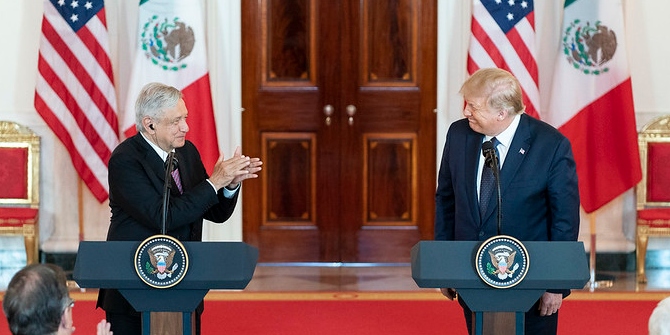 In recent months the administration of Mexican President, Andrés Manuel López Obrador, has moved to reform the country’s higher education system by cutting funding and creating new ‘popular’ universities. Jesus Velasco argues that these reforms will cause long-term damage to the country’s future by reducing access to education for the underprivileged and further increasing the brain drain of scholars to the US.
In recent months the administration of Mexican President, Andrés Manuel López Obrador, has moved to reform the country’s higher education system by cutting funding and creating new ‘popular’ universities. Jesus Velasco argues that these reforms will cause long-term damage to the country’s future by reducing access to education for the underprivileged and further increasing the brain drain of scholars to the US.
Today, Mexican higher education is under assault. Today, science is being threatened, is in danger, and could collapse. During his 2018 presidential election campaign, Andrés Manuel López Obrador (AMLO) promised to introduce the ‘Cuarta Transformacion’ or Fourth Transformation (4T) to reform Mexican society. Since AMLO’s election victory, this transformation has also included short-sighted reforms to the entire Mexican science and higher education system. On May 23, 2020, Mexican authorities issued a decree reducing in 75 percent of the budget allocated for materials and supplies as well as general services. This decision affects not only CIDE (the Centre for Research and Teaching in Economics), where I worked for 21 years before coming to the US, but 26 CONACYT Public Research Centers (PRC). On June 1, after many criticisms from academics and intellectuals, the government backed down. However, the Executive Decree (Decreto de Autoridad) issued this past April continues to be in force. The decree will affect financial aid for students—at CIDE 60 percent of the aid goes to students that come from working-class families. This will seriously jeopardize the purchase of supplies, journal subscriptions, research itself, scholars’ participation in national and international seminars, fieldwork, and so on.
In a country that, for decades, has undervalued science and technology, AMLO’s strong blow to higher education is a continuation—perhaps the most devastating one—of the national indifference to higher education. Government, the private sector, and political parties of all tendencies have long demoted and relegated science and technology. For example. in 2007 and 2016, the percentage of Mexico’s GDP spent on research and development was 0.36 and 0.38, respectively. In Brazil, it was 1.08 and 1.26. In 2017, gross spending on research and development in Mexico’s business sector was one-tenth of a percentage point of GDP (.01), while the OECD average was 1.04.
The importance of investing in education
Specialists in education, public intellectuals, journalists, or thinkers of all types, agree that a solid education is essential not only for economic growth and material progress of any country but also for the human development of its inhabitants. “For good or for ill,” asserted the eminent historian of science Richard S. Westfall in 1986, “science stands at the center of every dimension of modern life. It shapes most of the categories in terms of which we think, and in the process has frequently subverted humanistic concepts that furnished the sinews of our civilization.”

“Chalk” by Quinn Dombrowski is licensed under CC BY SA 2.0
History has proven this many times. The fact that South Korea is one of the most developed economies on the planet is due mainly to its substantial investment in education since the end of the Korean War. Many believe that high-quality education has been a central component of its rapid transformation. According to the OECD, in 2018, South Korea spent 4.5 percent of its GDP on research and development (R&D), while Mexico only spent 0.3 percent. The number of researchers per million inhabitants in South Korea, with a population of 52 million people, was 6,826. In Mexico, with a population of 126 million, it was 251. Finland is another case in point. With a population of 5.5 million people, the country invests 3.2 percent in R&D with 7,009 researchers per million inhabitants. These numbers are accompanied by an robust education policy. To be a primary or high school teacher in Finland, a master’s degree is required. Teachers earn an excellent income, which makes the profession highly competitive. Finnish people hold educators in high esteem; socially, teachers are seen as valuable as medical doctors, lawyers, or engineers. Finnish investment in education has turned their country into a knowledge-driven economy. Unfortunately, this is not the case of Mexico; ignorance prevails.
The potential long-term damage of AMLO’s education reforms
Indeed AMLO’s decisions are nothing new for Mexico, but they are particularly decisive and threaten to undo the academic infrastructure that worked and prospered despite all odds. Recent decisions could lead to at least three significant consequences. First, scholarships will disappear, affecting fundamentally unprivileged students. CIDE, El Colegio de San Luis, El Colegio de la Frontera Norte, El Colegio de Michoacán and many other institutions will become more elitist centers—if they survive—filling their classrooms with students from the best private schools. The 4T, with its populist claim of working for the well-being of the common people, is removing equal access to a high-quality education from Mexico’s youths. Equal opportunity is gone. Second, there will be a diaspora of first-class scholars from public to private institutions; access to the best teaching and research will become unreachable for poor and working-class students. AMLO has promised to create hundreds of new public “popular” universities with no clear academic standards for the recruitment of both professors and students. In a country that has invested so little in R&D, good scholars and teachers, are often few and far between. Nevertheless, CIDE and similar institutions have successfully, if modesty, fulfilled an important social and intellectual role. Third, the Mexican brain drain will grow even more than it has in the past. Over the last thirty years or so, many Mexicans have emigrated to work in different universities around the world. Eminent scholars such as Rodolfo Dirzo, Mario Molina, Mauricio Tenorio, Ignacio Chapela, and Jorge Soberon have left Mexico to teach in the United States. They are not training Mexican scientists or historians; they are educating American students.
Until now, four important reasons have explained the departure of Mexican scholars to the United States and other parts of the world. First, the lack of resources. Often, researchers do not have the infrastructure, economic resources, and time to conduct their work. Big teaching loads, bureaucratic obstructionism, and the lack of meritocracy complement the cloudy panorama, also attribute to the departure of Mexican scholars. Second, the involvement of politics in Mexican academic life is an enduring burden. In Mexico, politics is engaged in science and technology, culture, and education. From the way the head of CONACYT is appointed to the selection of the Presidents or Rectors of many research centers in the country, or the allocation of the economic resources, the heavy hand of government is felt. Third, poor salaries contribute to the mobility. Frequently, scientist’s incomes are not living wages. Their career often becomes socially irrelevant and poorly rewarded. Fourth, many scholars are leaving the country for security reasons. Every single day it is more complicated to enjoy a safe and peaceful life in Mexico. Violence grows daily, and drug trafficking controls parts of public life. The 4T has proven unwilling or incapable of effectible addressing the country’s rampant violence. As if these were not enough reasons, now the 4T and its supreme leader are trying to finally kill a wounded science and educational system. To burn your home has never been a wise decision. Self-inflicted pain not only harms the person who self-scourges, but also damages the people around.
I hope that the president of Mexico will reconsider and understand that without excellence in science and education, the country will perish in the long run. To silence the thinking voices, in a country with few voices, is neither prudent nor astute. The current world health crisis provoked by COVID-19 has once again shown the relevance of science and technology. Albert Einstein once said, “only two things are infinite, the universe and human stupidity, and I am not sure about the former.” Let’s pray that AMLO and his followers prove that at least partially, Einstein was wrong.
Please read our comments policy before commenting.
Note: This article gives the views of the author, and not the position of USApp– American Politics and Policy, nor of the London School of Economics.
Shortened URL for this post: https://bit.ly/3ecCsSA
About the author
 Jesus Velasco – Tarleton State University
Jesus Velasco – Tarleton State University
Jesus Velasco is the Joe and Teresa Long Endowed Chair in Social Sciences at Tarleton State University. He is the editor of American Presidential Elections in Comparative Perspective: The World is Watching (2019), and author of Neoconservatives in US Foreign Policy Under Ronald Reagan and George W. Bush: Voices Behind the Throne (2010).







1 Comments